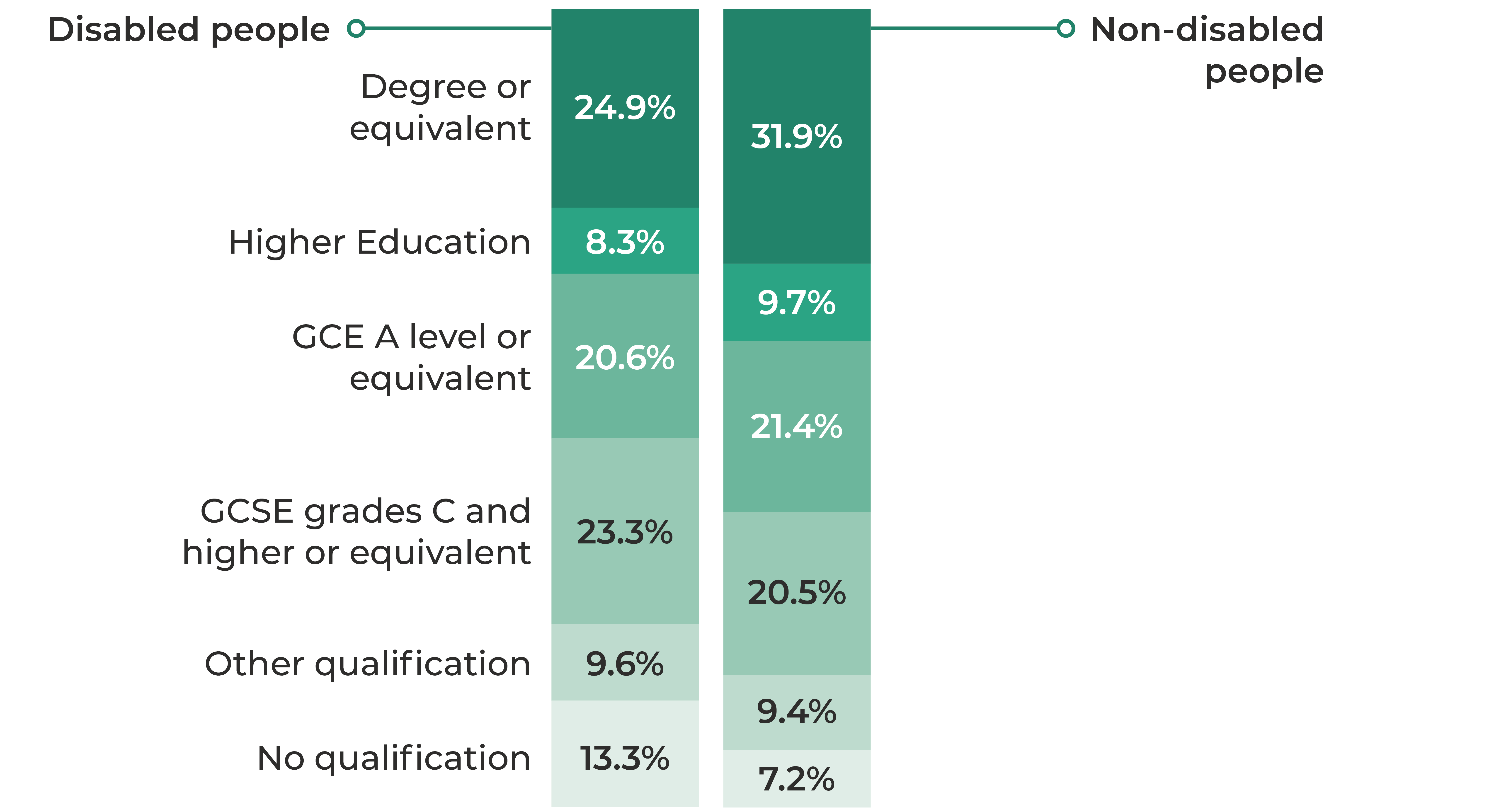Both the UK and Welsh governments are committed to supporting disabled people’s access into employment and to reducing the disability employment gap. While the Welsh Government has responsibility for employability and skills, employment support and social security are the responsibility of the UK Government.
Last year, the UK Government hit its goal to see a million more disabled people in work but that only tells part of the story. While more disabled people are in work, the gap between working age disabled and non-disabled people has actually increased.
The Welsh Government has said it wants to close the gap between disabled people and the rest of the working population and has committed to incorporate the UN Convention on the Rights of Disabled people into Welsh Law (Article 27 recognises the right of disabled people to work on an equal basis with others). The Scottish Government also intends to incorporate the Convention, and the UK Government, despite ratifying the Convention in 2009, has not made any commitment to incorporate it into UK law.
In this article, we look at the evidence and the progress made in achieving this commitment
The disability employment gap
The campaign group Disability Rights UK argues that:
Barriers to more disabled people getting employment do not lie with Disabled people ourselves but with society – including inaccessible transport, poor employer attitudes, inadequate flexible working and Access to Work Support and failure to make reasonable adjustments.
By May 2022 a million more disabled people in the UK were in work. However, data for July to September 2022 shows the disability employment rate has fallen since the same time last year, with the non-disabled employment rate rising. This means the disability employment gap (i.e. the gap between working age disabled and non-disabled people) was at its widest point since 2018.
The figures had begun to recover to pre-pandemic levels, however several reasons are thought to have contributed to this including an increase in the numbers of people being classed as disabled.
At 32.3 percentage points the ‘disability employment gap’ in Wales is higher when compared to Scotland (31.6 percentage points) and the UK as a whole (29.8 percentage points). In Wales, the greatest disability employment gaps are in Blaenau Gwent (46.8 percentage points) and Neath Port Talbot (44.5 percentage points). Both feature on the top 20% disability employment gaps in the UK.
Employment rate of people aged 16-64 by disability status, Wales (year ending June 2014 to year ending June 2021)
Source: Annual Population Survey – Disability and employment.
This gap is larger for disabled people who have no or few qualifications.
Highest level of qualification of people aged 21 to 64 by disability status; UK, July 2020 to June 2021

Source: Annual Population Survey – Raw pay gaps by disability, ONS.
Alongside the disability employment gap, disabled workers are also more likely to be working part time, with 41% of disabled workers and 29% of non-disabled workers working part-time.
Proportion of workers aged 16+ by number of hours worked and disability status, Wales
Source: Census 2021 - Disability and hours worked, ONS.
Part-time is 30 hours or less worked per week. Full-time is 31 or more hours. Disability is defined under the Equality Act
UK Government actions to support disabled people into work
The Equality Act 2010 prohibits both direct and indirect disability discrimination in employment and recruitment. Employers must make reasonable adjustments to support disabled job applicants and employees. Reasonable adjustments can include making changes to the recruitment process, physical working environment, equipment or to an employees working hours.
Alongside this legislation to protect the rights of disabled people, the UK Government has put in place a plan to support disabled people access employment. Initiatives include the Access to Work scheme which provides support to meet the needs of disabled people in the workplace, to help them find or stay in work.
The Disability Confident scheme helps employers create more accessible and diverse workforces by championing inclusive recruitment practices.
In March the UK Government published its Health and Disability White Paper which aims to help “unemployed disabled people to move back into and remain in work”. However, the campaign group Disability Rights UK is concerned that it is removing the Workplace Capability Assessment which assess whether a disabled person can work and protects those who can’t from benefit sanctions with “instead a system geared to driving disabled claimants into seeking and applying for jobs”.
Welsh Government actions
The Welsh Government has published several plans which aim to increase disabled people’s access to work. The 2018 Employability Plan sets out its commitment to increase the number of disabled people in work and work with employers to ensure workplaces are inclusive and supportive environments
In 2019 the Right to Independent Living Framework and Action Plan established a network of Disabled People’s Employment Champions to engage with employers to encourage more employment of disabled people. It reaffirmed the Welsh Government’s commitment to use the Social Model of Disability to underpin its employment policies and recruitment methods, and to share the approach as part of a wider movement to remove employment barriers for disabled people.
The Learning Disability Strategic Action Plan 2022 to 2026 prioritises improving access to employment, training and support for people with learning disabilities. The plan for employment and skills, published in March 2022, placed a renewed focus on improving labour market outcomes for disabled people.
In July 2021, the Disability Equality Forum published the report: ‘Locked Out: Liberating Disabled People’s Lives and Rights in Wales beyond COVID-19. The Welsh Government has set up a Disability Rights Taskforce to address the issues highlighted in the report, which include employment and income. A ‘Disability Rights Action Plan’ is expected in March 2024.
Next steps
Despite focus on improving employment outcomes for disabled people, there appears to be little research into how it can be addressed.
Disability Wales has identified several issues which impact disabled people’s access to work, with a key issue being “reluctance by employers to implement their reasonable adjustments”. Poor access to legal aid can make it difficult for disabled people to benefit from legislation that exists to protect their rights (many do not have the resources to support a tribunal process).
A report by Leonard Cheshire highlighted a lack of awareness and delays to support schemes like Access to Work and discrimination and negative attitudes towards disabled people among some employers.
The Welsh Government is still working on its disability rights action plan, which should make clearer how it intends to address the disabled employment gap. We’ll need to wait another year before that’s published. For now, there’s little evidence that progress has been made to incorporate the UN Convention on the Rights of Disabled People into Welsh law.
This would mean disabled people’s rights would have to be taken into account when making laws in the Senedd and would provide a framework for developing policy, a move long called for by disability organisations.
Article by Claire Thomas and Joe Wilkes Senedd Research, Welsh Parliament








